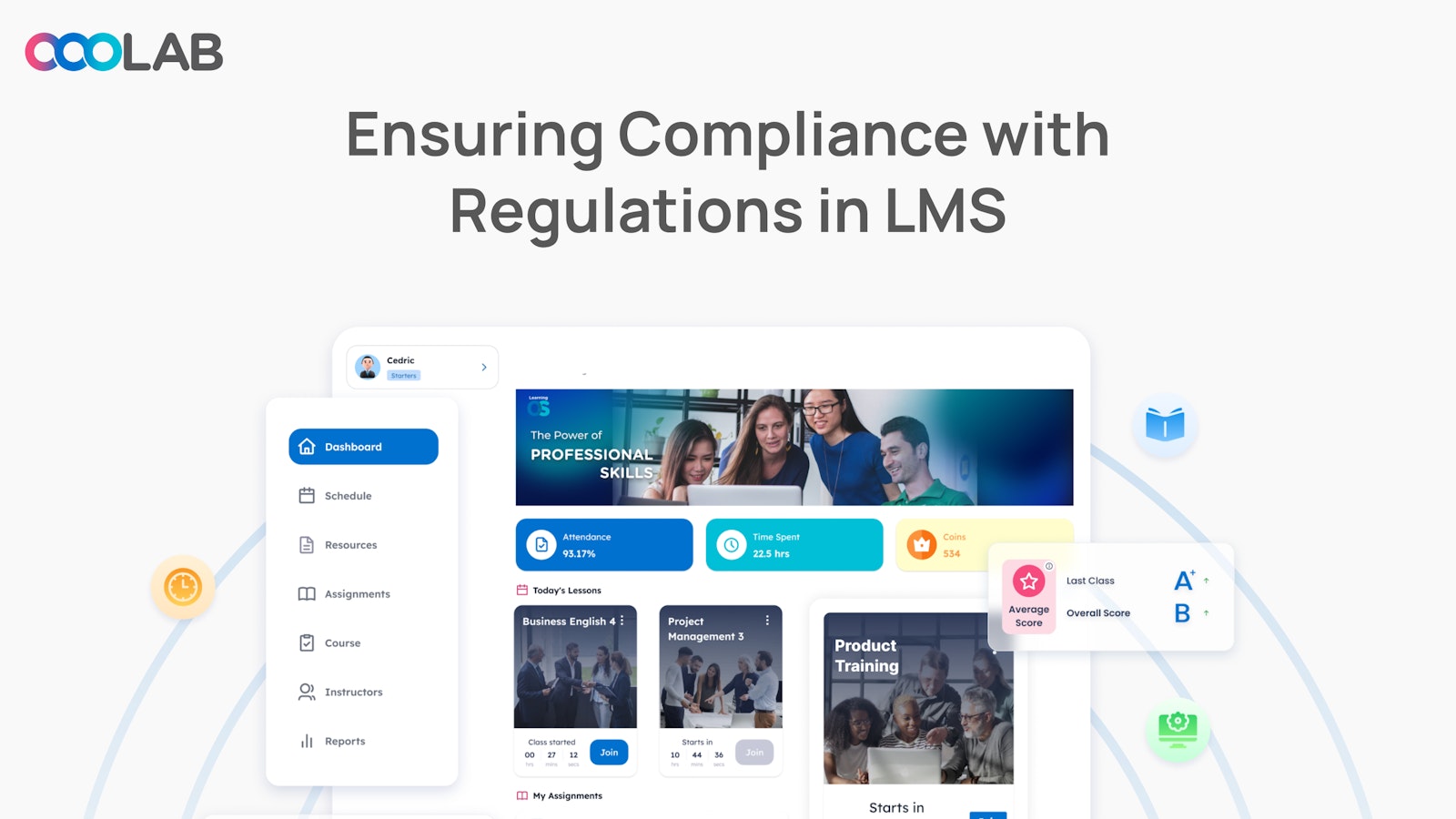

In today's digital age, learning management systems (LMS) have become indispensable tools for organizations of all sizes. They streamline training, improve employee performance, and enhance overall efficiency. However, with the increasing complexity of regulatory landscapes, ensuring compliance with relevant laws and standards is paramount.

To effectively navigate the complex regulatory landscape, it's crucial to understand the key regulations that impact LMS platforms. Here are some of the most prominent ones:
FERPA governs the privacy of student education records. For educational institutions using LMS, this means:
Data Privacy: Protecting a wide range of student information, including personally identifiable information (PII), academic records, disciplinary records, medical records, and financial aid records.
Access Controls: Implementing robust access controls to limit access to student data to authorized personnel, such as teachers, administrators, and counselors.
Parental Consent: Obtaining parental consent before disclosing personally identifiable information (PII) to third parties, except in specific circumstances, such as for school officials, teachers, and other school officials, as determined by the school district.
HIPAA safeguards patient health information. Healthcare organizations using LMS must adhere to:
Data Security: Implementing a comprehensive security program to protect electronic protected health information (ePHI), including physical, technical, and administrative safeguards.
Access Controls: Limiting access to patient health information to authorized individuals based on their roles and responsibilities.
Data Breach Notification: Promptly notifying affected individuals and the appropriate authorities in the event of a data breach.
GDPR is a comprehensive data protection law that applies to organizations processing personal data of EU residents. Key compliance considerations for LMS include:
Data Subject Rights: Respecting individuals' rights to access, rectify, erase, restrict, and object to the processing of their personal data.
Data Minimization: Collecting and processing only the necessary personal data to fulfill specific purposes.
Data Protection by Design and Default: Implementing data protection measures from the outset of LMS development and operations.
Data Breach Notification: Promptly notifying the supervisory authority and affected individuals in the event of a data breach.
Best Practices for LMS Compliance
To ensure your LMS remains compliant with relevant regulations, consider implementing the following best practices:
Strong Access Controls: Implement robust access controls, such as multi-factor authentication, role-based access, and single sign-on (SSO), to limit access to sensitive data.
Regular Security Audits and Penetration Testing: Conduct regular security assessments to identify and address vulnerabilities.
Data Encryption: Encrypt sensitive data both at rest and in transit to protect it from unauthorized access.
Data Loss Prevention (DLP): Implement DLP measures to prevent accidental or malicious data loss.
Regular Security Awareness Training: Educate users about security best practices to minimize human error.
Clear Data Retention Policies: Establish clear data retention policies that align with regulatory requirements and organizational needs.
Secure Data Destruction: Develop secure procedures for deleting or anonymizing data when it's no longer needed.
Regular Data Purging: Implement regular data purging processes to remove outdated or unnecessary data.
Role-Based Access Control (RBAC): Assign users specific roles and permissions based on their job functions and responsibilities.
Least Privilege Principle: Grant users only the minimum level of access required to perform their tasks.
Regular Access Reviews: Regularly review and update user access permissions to ensure they remain appropriate.
Incident Response Team: Establish a dedicated incident response team to handle data breaches effectively.
Incident Response Plan: Develop a comprehensive incident response plan that outlines steps to be taken in the event of a data breach.
Regular Testing: Test the incident response plan regularly to identify and address weaknesses.
Notification Procedures: Establish procedures for notifying affected individuals and authorities in a timely manner.
By implementing these best practices, you can significantly enhance your LMS's security and compliance posture.
In today's digital age, technology can be a powerful ally in ensuring LMS compliance. Here are some tools and strategies to consider:
Protect Sensitive Data: Use these tools to mask or anonymize sensitive data, reducing the risk of data breaches.
Compliance Adherence: Ensure compliance with regulations like GDPR by minimizing the amount of personal data processed.
Proactive Identification: Employ automated tools to continuously monitor your LMS for potential compliance issues.
Efficient Resolution: Quickly identify and address compliance gaps, reducing the risk of penalties.
Enhanced Security: Consider cloud-based LMS solutions that offer robust security features and compliance certifications.
Scalability and Flexibility: Benefit from the scalability and flexibility of cloud-based solutions to meet evolving compliance needs.

In today's regulatory landscape, ensuring LMS compliance is no longer an option but a necessity. By understanding key regulations, implementing best practices, and leveraging technology, organizations can safeguard their LMS platforms and protect sensitive data.
Remember, LMS compliance is an ongoing journey. Stay vigilant, adapt to evolving regulations, and embrace technology to ensure the long-term security and success of your LMS!!
Book Free Demo with us. Bring your Training and Learning to a new height with LearningOS.
About us
At OOOLAB (pronounced 'uːlæb'), our mission is to make complex learning operations simple. We aim to positively impact the lives of over 1,000,000 learners and educators by the end of 2026.
OOOLAB's LearningOS provides educational institutions and corporate enterprises with an all-in-one solution to create and deliver engaging learning experiences.
Reach out to us at: Linkedin, FaceBook
Our platform is easy to use and automates all aspects of your learning operations. It efficiently manages complex tasks, allowing you to concentrate on delivering exceptional learning experiences.
Our all-in-one software solution combines a Content Management System, a Learning Management System, content authoring tools, and a mobile friendly Learner Portal.
Absolutely! LearningOS is an Enterprise LMS is a great fit for corporate learning. In fact, we have clients with up to 700,000 employees using LearningOS! Upskill your workforce by creating and assigning interactive eLearning content while effortlessly tracking employee progress.
Our platform is currently used by over 120,000+ learners, parents, and employees across 21 countries worldwide!
We offer ready-to-go curriculums for various educational purposes or our expert design team can build a custom course for you. We can also upload your existing learning materials and enhance them digitally.
Our platform, designed by educators for educators, provides you with all the tools you need to scale. Build and promote your own hybrid and blended learning courses and save money on licensing fees by owning your own proprietary content.
Schedule a meeting with our experts and we’ll talk about how our platform can address your unique challenges and help to grow your business.